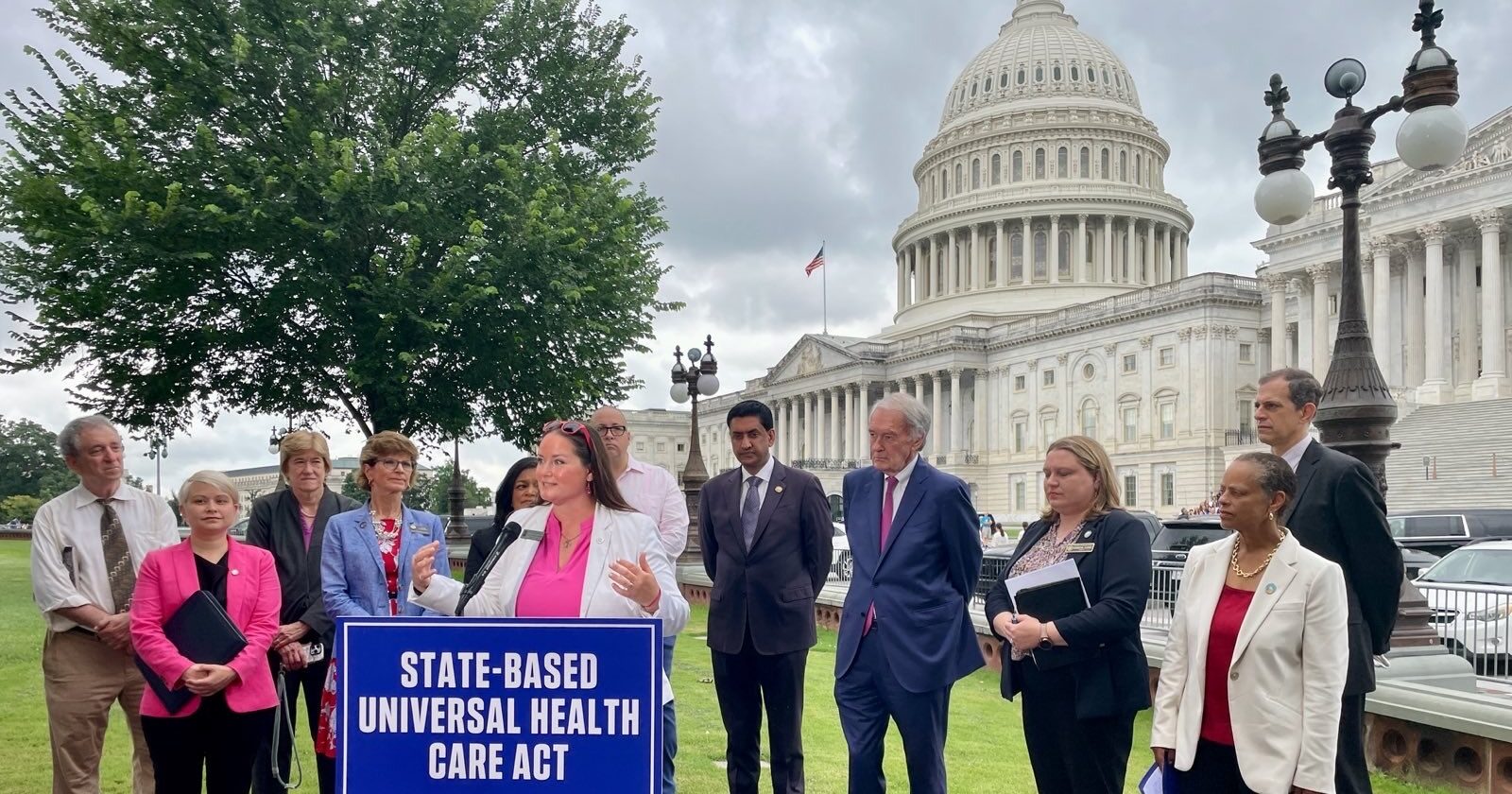PHOTO: From left to right: Chuck Pennacchio (President of One Payer States); state Rep. Michele Grim (D-Ohio); state Delegate Sheila Ruth (D-MD); state Rep. Karen McCormick (D-Colo.); state Sen. Gustavo Rivera (D-N.Y.); U.S. Rep. Pramila Jayapal (D-Wash); U.S. Rep. Ro Khanna (D-CA); U.S. Sen. Ed Markey (D-MA); state Rep. Christal Lloyd (D-N.H.); state Sen. Rachel Talbot Ross (D-Maine); and Robert Weissman (President of Public Citizen). |
|
|
|
WASHINGTON, D.C., July 17, 2025 — State Rep. Carrie A. Rheingans (D-Ann Arbor) joined U.S. Rep. Ro Khanna (D-CA) and U.S. Sen. Ed Markey (D-MA) as they reintroduced the State-Based Universal Health Care Act (SBUHCA), legislation which would provide states with federal funding streams and regulatory flexibility to create and adopt their own universal healthcare plans. Rheingans was instrumental in coordinating the inclusion of other state legislators to speak at the press conference, including state Rep. Karen McCormick (D-Colo.), state Del. Sheila Ruth (D-MD.), state Sen. Rachel Talbot Ross (D-Maine), state Rep. Christal Lloyd (D-N.H.), state Sen. Gustavo Rivera (D-N.Y.), and state. Rep. Michele Grim (D-Ohio). The state legislators spoke about why universal healthcare is needed and to their states’ own proposals, including Rheingans, who recently reintroduced her single-payer healthcare bill, MiCare, HB 4407 of 2025. Health care in America is reaching a breaking point. Costs are rising fast and 17 million Americans could lose coverage because of the so-called “One Big Beautiful Bill.” Additionally, hundreds of rural hospitals are at risk of closing across the country and 100 million Americans are struggling with medical debt. That’s why Rheingans, Khanna, and Markey agree: the current system isn’t working, and it’s time for bold action. “As leaders, our responsibility is to have a plan ready — because if the health care system collapses in the coming years, we can’t afford to be caught off guard,” Rheingans said. “I believe the best way forward is through a universal health care system with a single, public payer — whether at the state or federal level. Americans should have the freedom to change jobs or start a business without the fear of losing their coverage. That’s what the American dream is all about. With Medicare for All, we could deliver more care at a lower cost, making the system simpler and more affordable for patients. At the end of the day, quality care for every patient should be the top priority.” Khanna and Markey introduced the SBUHCA because they recognize that states have the unique ability to lead the charge towards universal healthcare, a similar approach to how universal healthcare was achieved in Canada. Specifically, the SBUHCA creates a waiver granting states the ability to curate and provide state-specific health care plans for residents via access to federal funding streams and flexible regulations. To apply for the waiver, participating states or groups of states must propose plans to provide health care coverage for 95 percent of their residents within five years. The SBUHCA also requires benefits provided under state plans to be equal to or greater than those currently received by federal beneficiaries. An independent panel of health care experts and officials would evaluate whether a state’s proposal meets the requirements and would then provide a public recommendation of waiver application approval or rejection to the Secretary of Health and Human Services. “With the passage of Trump’s Big Ugly Bill, Republicans chose to put corporate wealth over the public’s health. We must fight for a system that cannot be raided by billionaires, that doesn’t charge too much for too little, leave people in debt, burn out health providers, and deny the high quality, unlimited care that people deserve,” Markey said. “The State-Based Universal Health Care Act would allow states to pave the way toward a system that is not driven by profit, but by people’s health. It’s time we create a system that protects access to high-quality, affordable care and moves us closer to the reality of Medicare for All.” The majority of Americans agree, with nearly 60% in support of universal healthcare. “The State-Based Universal Health Care Act would allow states already poised to lead on this, like Massachusetts, California, and New York, to enact cutting-edge health care systems that improve access for patients while reducing wasteful spending,” said Eagan Kemp, Health Care Policy Advocate at Public Citizen. “This bill would make it easier for every state to take the necessary steps to implement efficient single-payer health care and ensure that everyone in the state can get the care they need when they need it. Such reforms would also mean massive savings on health care costs for both states and cities. At a time that access to healthcare is under attack by greedy corporations and craven politicians, this bill would allow states to implement single-payer health care and show a path to finally achieving guaranteed universal health care in the U.S.” The full State-Based Universal Health Care Act bill can be viewed here. ### |

